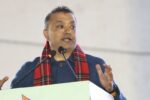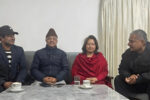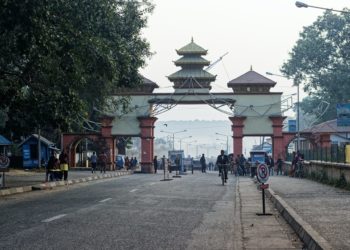KATHMANDU: A number of questions have been raised over the initiatives taken by the Ministry of Health and Population to contain the pandemic coronavirus.
Such concerns are common at a time when the powerful nations are also falling behind in their steps to prevent and control the coronavirus.
Interacting with the journalists at the Ministry on Saturday in the presence of secretary and departmental chiefs, Minister for Health and Population Bhanu Bhakta Dhakal shared his plans to expand the coronavirus testing scope in the country.
“We are expanding our capacity to test at least 10,000 individuals every day within June 29. We are also issuing guidelines from the council of ministers for home isolation with the consultation of the experts as the number of coronavirus infected is on the rise,” Dhakal added.
He also shared that the government was working in a coordinated fashion to win the battle against the pandemic virus.
Responding to a query, Minister Dhakal said that there was no irregularity in the procurement of health materials as the concerned bodies bought the health supplies with due process.
He reiterated that he was for fair practice in politics and those alleging Minister Dhakal of his involvement in the irregularity would have to remorse in the future.
Additional human resources for contact tracing
Meanwhile, the government is preparing a team of 3,225 individuals for the contact tracing.
Ministry’s Secretary Laxman Aryal said that two-thirds of the human resources would be from the health sector and others would be fresh recruitment as per the procedure approved by the Council of Ministers meeting.
Five more labs to be set up
Secretary Aryal shared that PCR machines are being installed and laboratories set up at five additional places for expanding the reach of tests for coronavirus. According to him, the lab would be set up at the Nepal Army Hospital, Nepal Police Hospital, the Armed Police Force Hospital and at Dailekh and Dadeldhura.
“We would be able to conduct tests at the rate of 10 thousand tests daily with the upgrading of the existing laboratories and establishment of five additional ones. It is not necessary to purchase a PCR machine for every local level,” he said.
Director of the National Public Health Laboratory, Dr. Runa Jha acknowledged that the reports of tests were delayed due to the sheer number of samples submitted for testing at present. She, however, said that all the samples that have been collected would be tested within one week from today.
Director at the Epidemiology and Infectious Diseases Control Division, Dr. Basudev Pandey, said the contact tracing of all the infected persons was being carried out. Director General at the Department of Health Services, Dr. Dipendra Raman Singh stated that there is adequate stock of required medical supplies for COVID-19. He added that there was enough stock of personal protective equipment (PPE), N95 masks and surgical masks to last for a month.
According to him, the process of procuring medical goods would be continued considering the number of COVID-19 cases.
Cases estimated to reach 40 thousand till mid-August
The number of people infected by coronavirus till date is 8,605 and this number is expected to reach a maximum of 40 thousand till August 18 estimating the number of Nepalis coming home from abroad including India, Ministry’s joint secretary Dr. Gunaraj Lohani said.
In the meantime, coronavirus testing laboratories have been set up in 22 places while the number of corona special hospitals has been expanded. At present, the number of ventilators has been expanded to 1,000 and the number of ICU to 1,800.
The Ministry of Health and Population is at work to conduct tests of two percent of the total population of the country (600,000 populations) across the country as stated by Prime Minister KP Sharma Oli in an address to the nation.
Public health emergency announcement under study
The Ministry had decided to recommend the Cabinet meeting held on June 4 to declare a nationwide public health emergency in view of increasing infection cases.
Minister Dhakal however said a decision in this regard would not take place at present. Efforts to prevent and control the infection are taking place in coordination with the Ministry and the COVID-19 Crisis Management Centre, he said.
There is a guideline that 25 percent of the total swabs collected by government mechanism on a daily basis is given to private health institutions for a test. Per head cost incurred for the test would be reimbursed from the government to the private health institutions. Each test is charged between Rs 3,000 and Rs 4,000.








Comment